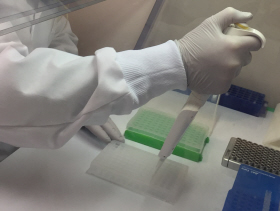



Diagnosis Murder
In September 2000, Ian Lowther, a UK national, was sentenced to life imprisonment for a murder he committed 23 years earlier. His conviction was made possible by advances in biotechnology, which allowed forensic scientists to match his DNA to samples found on the victim's body. Since then, DNA profiling has become standard crime scene practice.One of the companies that has pioneered the application of molecular biology, and which is a major supplier of DNA test kits to the US police, believes that the same know-how can help veterinarians and farmers. Life Technologies is a global company, which already supplies a wide range of biotechnical solutions to diagnostic laboratories, mainly for human healthcare and food safety testing. Now, the company believes that animal health could benefit from that same expertise.
"Diagnostic technology has advanced in leaps and bounds over the last few years," says European Professional Service Veterinarian, Dr Christina Boss.

"Thanks to improved molecular tests, we can now identify animal pathogens much more quickly and reliably than ever before, and detect infections at a much earlier stage. So veterinarians and farmers can make disease and herd management decisions with much greater confidence than before."
One of the gene technologies, which is proving most useful on-farm, is the PCR (polymerase chain reaction) test. Each test contains a specific strand of genetic material, which complements a section of the RNA or DNA from a specific pathogen. When the sample is repeatedly heated and cooled (so-called thermal cycling), the polymerase enzyme copies the specific gene code and effectively amplifies it. So even a small amount of the target pathogen in the sample can be detected.
Like most diagnostic tests, PCR is carried out under laboratory conditions, and requires a specialist processing machine and a series of different reagents. However, most testing facilities will have access to the required equipment and be able to carry out PRC tests.
Since PCR was the subject of the Nobel Prize in 1993, the technique has been enhanced and commercialised to the point where results can be obtained in a matter of hours. So-called rapid PCR tests are now available for a number animal diseases.
In Germany, Life Technologies has just been given FLI (Friedrich-Loeffler-Institut) approval for a rapid PCR test for MAP (Mycobacterium avium spp. paratuberculosis) - the cause of Johne's disease in cattle. The test can produce a result in just one day, compared to several weeks for conventional laboratory culture.
The speed and accuracy of PRC means that the test can be used as an integral part of biosecurity, herd surveillance, disease control and even disease eradication.
No longer should the veterinarian be left wondering "Who dunnit?".
For more information about swine diagnostics, click here or connect to the Thermo Fisher Scientific Swine Resource Center.
October 2012








